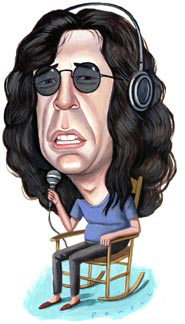 |
While March 19th marked the one year anniversary of the start of the war in Iraq, it also marked another anniversary – the day the mainstream press addressed the blurring boundaries between Clear Channel Communications and the Bush administration.
New York Times columnist Paul Krugman, writing in the International Herald Tribune, examines the “close links” between George W. Bush and Clear Channel management (Clear Channel’s vice president Tom Hicks helped make G.W. a multimillionaire) and points out how “the absence of effective watchdogs” make this merger between the media and the government possible. “In the Clinton years the merest hint of impropriety quickly blew up into a huge scandal; these days, the scandalmongers are more likely to go after journalists who raise questions.”
One of the first casualties of this “close link” was controversial disc jockey Howard Stern. “As soon as I came out against Bush, that’s when my rights to free speech were taken away. It had nothing to do with indecency,” Howard Stern said on March 19, 2004. Clear Channel dropped Stern’s show from 8 of its stations, following the imposition of a $495,000 Federal Communications Commission fine.
Film critic Roger Ebert weighs in on the Stern controversy, in an essay published April 16th in the Chicago Sun-Times.
Like millions of Americans, I listen to Howard Stern on the radio in the mornings. I think he is smart, quick and funny … A listener to Stern will find that he expresses humanistic values, that he opposes hypocrisy, that he talks honestly about what a great many Americans do indeed think and say and do … I find it strange that so many Americans describe themselves as patriotic when their values are anti-democratic and totalitarian.
Ebert goes on to say that what offends him “is that the right wing, secure in its own right to offend, now wants to punish Stern to the point where he may be forced off the air.”